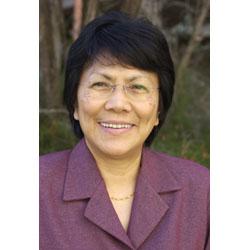Analytical scientist invited to visit German research group
Published on 16 July, 2003
CQU's Dr Vicky Vicente-Beckett has recently been re-invited as a Research Fellow of the Alexander von Humboldt Foundation (Germany) to undertake a two-month research visit at the University of Hannover’s Institute of Technical Chemistry, with the biotechnology research group of Professor Thomas Scheper.
 This is her third research fellowship award from the Foundation.
This is her third research fellowship award from the Foundation.
Her first award (20 months) was spent at the University of Bonn’s Institute of Physical Chemistry in the area of voltammetry and batteries. The second award (as a re-invited research fellow) was in the Department of Chemistry at Berlin’s Humboldt University to undertake work on abrasive stripping voltammetry.
The Alexander von Humboldt Foundation strongly supports former research fellows who have remained active in research and who are keen to continue research collaboration with German scientists and scholars.
Dr Vicente-Beckett, from CQU's School of Chemical and Biomedical Sciences, will be doing research on biosensors as part of her overseas visit, commencing in late August.
After leaving Hannover, she will visit Professor Joseph Wang at the Department of Chemistry of the State University of New Mexico (USA) for one month to undertake further work on biosensors.
Biosensors are detection devices which employ biological components (eg enzymes, antibodies or DNA) to detect various substances. Perhaps the most studied is a glucose sensor to measure blood sugar level, which often employs the enzyme glucose oxidase in the measurement. They are often highly selective, ie discriminating, and hence reliable. They may function in different ways - eg through measurement of light, electrical signal (current or voltage). There is often a need for portable and possible (bio)sensors.
Dr Vicente-Beckett's research in Germany will investigate a possible biosensor for polyphenol detection in grape and wines. Polyphenols are naturally present in grape, berries etc. Interest in them arises from various claims on their human health effects (both negative and positive). The beverage industry would also prefer a simpler but reliable analytical technique, such as a direct-reading biosensor device, to measure polyphenols than the current standard and more involved method.

